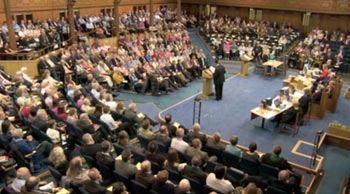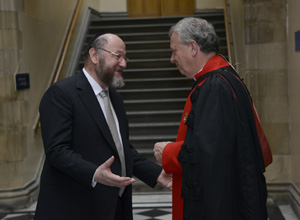Chief Rabbi Ephraim Mirvis today made history when he became the first Rabbi (and only the third Jew) to address the General Assembly of the Church of Scotland. The invitation to the Chief Rabbi of the United Hebrew Congregations of the Commonwealth must be seen as a welcome move towards healing the breach caused by last year's General Assembly's adoption of a report that criticised central Jewish belief about the land of Israel in politically loaded, factually inaccurate, and offensive terms, and its rejection of two amendments calling for dialogue with the Jewish Community.
After an introduction that reduced the entire Assembly to gales of laughter, Chief Rabbi Mirvis, who was attending the Assembly as the guest of the Lord High Commissioner, His Grace the Earl of Wessex, spoke of "the close and harmonious relationship that the Jewish Community in Scotland had enjoyed with the Church of Scotland, much to the benefit of our two great faiths", of the "urgent need for more meaningful and productive dialogue and cooperation between faiths in Scotland", of the "common roots and spiritual bond" between Jews and Christians, and of his "desire to promote religious and social harmony on the basis of the moral and social teachings common to our faith traditions ... striving to preserve religious commitment within our increasingly secular society".
 |
But the Chief Rabbi also directly addressed the strain on Jewish-Christian relations caused by last year's report, and called for "a deeper appreciation for of each other's traditions, leading to greater respect and stronger bonds between our faiths. For a real and meaningful relationship we need to internalise how the other views itself", asserting that "the door of the Jewish Community is always open to you." He went on to outline "the inextricable link between the Jewish People and the Land of Israel ... It goes to the very fibre of our being as a faith community and as a nation. It defines who we are. No events in history can shake this. ... There is no legitimate theological narrative or theological interpretation that can deny this fundamental and essential link", and he issued a challenge: "what can we do collectively and separately, that will advance the cause of peace by building confidence, respect, and understanding, while avoiding the spread of suspicion, mistrust, and fear?" "And it is precisely when things become difficult that continuing these conversations becomes all the more critical."
 |
The Chief Rabbi concluded: "We celebrate the extent to which Scotland is enriched by its faith communities. We, the Jewish community, are your partners, and we look forward to sharing the path ahead with you. Let us understand, let us empathise, let us learn from each other, and let us hear the still, small voice. Let us listen together, and walk together. Together is good."
The Chief Rabbi's address received warm applause from the Assembly, and in his response, the Moderator acknowledged that our two faiths have much in common, and made a commitment to continue respectful dialogue, as did the Rev Sally Foster Fulton, Convenor of the Church and Society Council in her oral report to the Assembly.
SCoJeC welcomes this change of heart, but regrets that senior figures in the Church continue to frame that dialogue in terms that present the Jewish community of Scotland as responsible for events in the Middle East. Like the Chief Rabbi, we look forward to a "more meaningful and productive dialogue ... that will advance the cause of peace by building confidence, respect, and understanding, while avoiding the spread of suspicion, mistrust, and fear" – even if, as the Moderator jokingly suggested, that requires us to lock up ten theologians from each community until they come up with a solution!
Click here to read the full text of the Chief Rabbi's address, and here to watch the video,